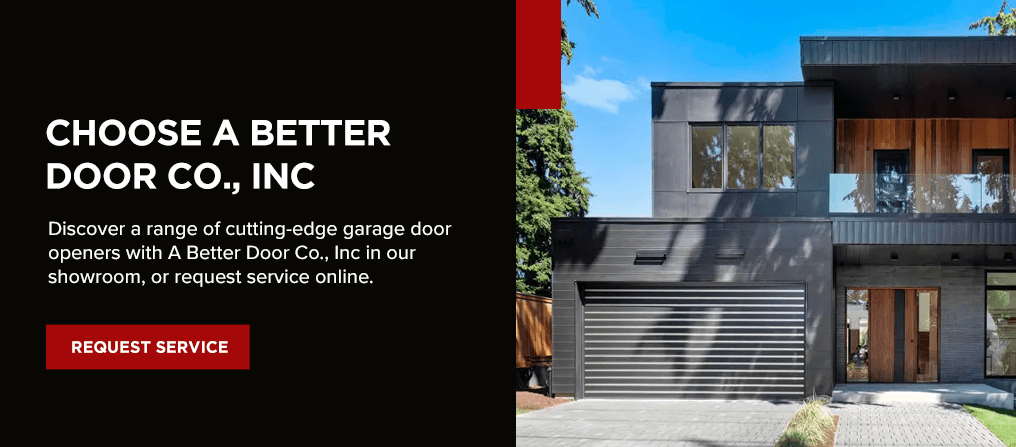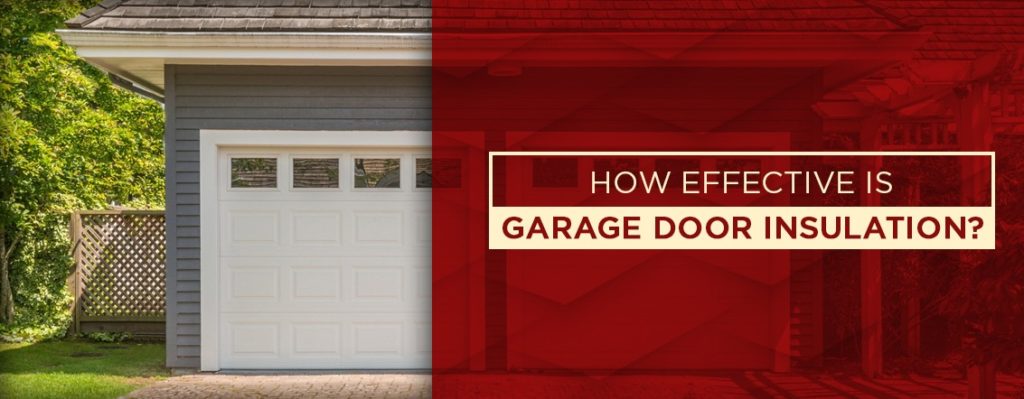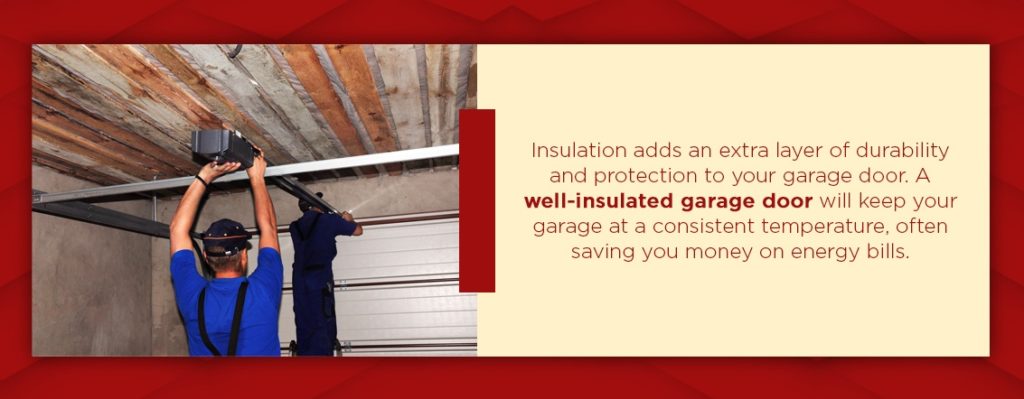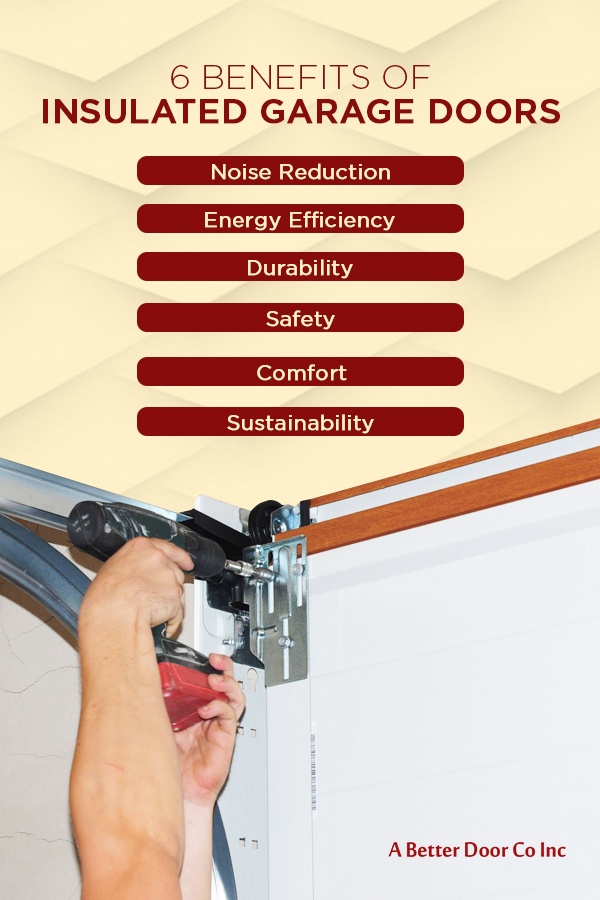Energy Efficient Garage Door Tips
Energy-Efficient Garage Door Tips
Your journey toward energy efficiency starts with your garage door. A few smart upgrades can yield many energy savings. With A Better Door Co., Inc by your side, enhancing your garage’s energy efficiency becomes seamless. Let’s explore insulation and how garage door opener upgrades can help.
Upgrade Your Insulation
Effective insulation is the cornerstone of an energy-efficient garage. A well-insulated garage door shields against hot and cold weather. It reflects in your energy bills. Here’s how you can ensure your garage door is well-insulated:
- Check your current door: Start by identifying the current insulation level of your garage door. Check for any drafts or cold spots around the door.
- Add insulation to your door: Employ a professional technician for the insulation task. Or opt for a do-it-yourself kit. DIY kits are budget-friendly and have all the necessary materials.
- Decide on energy-efficient garage door materials: Pick between foam board, reflective or batt insulation, or determine if an entirely new door would work best.
- Choose a new door: Select a high-quality, well-insulated garage door. The Clopay doors offered by A Better Door Co., Inc are an excellent choice. Both steel and wood garage doors offer energy-efficient options.
- Keep R-value in mind: Ensure the insulation or the door has a high R-value, which means it provides better thermal resistance than doors with lower ratings.
- Install the new door: Have a professional install the door. They will ensure it fits and offers maximum insulation.
- Maintain your door or insulation: Periodic checks and maintenance of the door are essential. They ensure long-term energy savings and energy conservation.
Get a New Garage Door Opener
Modern openers, designed with energy conservation, ensure lesser power usage with optimal function. A Better Door Co., Inc has various state-of-the-art garage door openers. That upgrade is a stride toward energy savings since newer models can use less power in standby mode. Here’s a step-by-step guide to upgrading your garage door opener:
- Research: Begin by researching energy-efficient garage door openers. Understand the benefits and potential savings. Explore our online collection to see our various garage door openers.
- Select: Choose a garage door opener that meets your needs.
- Install: Have your new energy-efficient garage door opener professionally installed. We will ensure optimal operation and energy savings.
- Maintain: Regular maintenance will keep your opener running efficiently.
Choose A Better Door Co., Inc
Discover a range of cutting-edge garage door openers with A Better Door Co., Inc, or request service online. Your leap toward a greener, cost-effective home is a call away — (631) 732-9654.
Commercial vs. Residential Garage Doors
Commercial vs. Residential Garage Doors
All garage doors generally function similarly and have the same purpose — allowing vehicles, people and other equipment to move in and out of a garage or other large space. But there are a few notable distinctions between commercial and residential garage doors. The main difference lies in the name — residential garage doors are for homes, and commercial garage doors are for business or industrial purposes. Why do we need to have these specific types of garage doors, and what are the commercial and residential garage door differences? Read on to find out more about these types of garage doors, and discover which is better for you.
Sizes of Garage Doors
One of the first differences you may notice between residential and commercial garage doors is their size. Generally, commercial garage doors are much bigger, to accommodate larger vehicles, but that depends on their intended use. Garage doors that need to fit large semitrucks or commercial machinery will need to be much larger than your typical residential garage door.
The standard height is seven feet for residential garage doors, and most are between eight and nine feet wide. Larger and customized sizes are available for homeowners with RVs or other unique situations, but these are usually custom-made residential garage doors. Commercial doors could suit a larger application on a residential property, such as for an RV. However, before installing a larger door like this on your property, check in with your homeowners’ association — if applicable — to find out if there are any restrictions to garage door size for your area.
Another size-related difference between these two types of doors is their weight. While all garage doors are relatively heavy, most residential garage doors weigh around 200 pounds, and commercial doors are much heavier. Garage doors made for commercial use generally consist of sturdier, weightier materials, with a finished commercial garage door often weighing 1,000 pounds or more.
Materials Used for Garage Doors
Another main difference between commercial and residential garage doors is the materials used for the doors themselves. Residential garage doors can consist of a wide range of materials, including different woods and metals, depending on each homeowner’s budget, style and taste. Various materials provide distinctive looks, and can match other exterior elements’ style. Each of these materials may have different pros and cons — wooden doors may provide maximum visual appeal, while steel doors feature long-lasting durability.
On the other hand, commercial garage doors have a much narrower field of commonly used materials. Because these doors usually go through much heavier-duty usage and should be durable, commercial garage doors often consist of industrial-strength metals like steel, aluminum or metal blends. These doors must stand up to the increased wear and tear of opening and closing many times a day, much more than a typical home garage door. These heavy-duty metal doors’ appearance matches the industrial look of many commercial buildings, and may look out of place in a residential setting.
Garage Door Appearance
For residential garage doors, appearance is a much more significant factor than for commercial doors. A garage door is often a substantial part of the home’s curb appeal, especially if it’s part of an attached garage in front of the house. For this reason, many residential garage doors have added visual features such as windows, distinctive hardware, designs and colors. The wide range of color and design choices ensures homeowners can find a garage door that fits in with the home design’s overall aesthetic. Property owners often choose their garage door to match exterior features on the rest of the house for the most cohesive look.
However, with commercial doors, appearance is often far less essential. While many commercial and industrial buildings still want a cohesive look, the right appearance for this type of structure will be a more streamlined, utilitarian door. Commercial garage doors tend to be modest in appearance, without the unique colors, designs and features you’d find on a residential garage door. They are often simple and have a roll-up or flat door style, with neutral colors like white, beige or gray. While the focus is more on commercial doors’ function, they can still be attractive, especially with a sleek, modern style.
Difference in Value
When comparing commercial vs. residential garage doors, one thing you may notice right away is a considerable difference in the costs involved. Commercial garage doors are generally much more expensive to purchase, install and repair. That’s because of the sturdier materials used for commercial garage doors, and the industrial quality that makes them durable and able to stand up to heavier use. Commercial doors must also meet a higher security standard, and are often custom-fit to a particular space and purpose, driving the costs up. They must have specially designed door openers that can hold these larger, sturdier doors’ extra weight and withstand more frequent usage.
The higher price tag associated with commercial doors are a prevalent reason they’re not common in residential areas. These larger doors’ added costs generally make them unnecessary for use on a home garage.
Shop Commercial and Residential Garage Doors
Commercial and residential garage doors have many differences, and familiarizing yourself with all these can help you make the best choice for your needs. Whatever type of garage door you need, you can find it at A Better Door. We are proud to be a Master Authorized Dealer of Clopay garage doors, and feature a wide range of styles for you to choose from. For home garages, shop our selection of residential garage doors and openers to find the best style that matches your home design. And for business use, shop our commercial garage doors for options that provide the extra strength and security your business needs.
SHOP COMMERCIAL DOORS SHOP RESIDENTIAL DOORS
How Effective Is Garage Door Insulation?
Is it Worth Buying An Insulated Garage Door?
If you are in the market for a new garage door — or simply want to upgrade your current one — you have probably encountered a lot of questions and choices. What style door do you want? What kind of door opener is best for your lifestyle? Do you want a door with windows? What is an insulated garage door? Should you choose an insulated or uninsulated garage door? Does insulation even work?
At A Better Door Company, we want to help you make informed decisions. In this guide, we’ll discuss the pros and cons of insulated garage doors and how important garage door insulation is for energy efficiency, comfort and safety. In short, yes, insulating a garage door will help your home maintain temperatures in hot and cold seasons and retain energy efficiency. But let’s unpack that more, keep reading to learn more about the kinds of insulation and what each will do for you.
Table of Contents:
- Why Insulation Is Important for Garage Doors
- 6 Benefits of Insulated Garage Doors
- Cons of Garage Door Insulation
- Types of Garage Door Insulation Materials
- What Is R-Value and Why Does It Matter?
- So…How Effective Is Garage Door Insulation?
Why Is Garage Door Insulation Important?
Insulation adds an extra layer of durability and protection to your garage door. A well-insulated garage door will keep your garage at a consistent temperature, which helps reduce your energy costs. Insulating your garage door is expected to help your garage remain a difference of 10-14 degrees warmer in the winter and as much as 22-26 degrees cooler in the summer. With Long Island averaging a high of 84 degrees in July and an average low of 41 in January, that can make a big difference for anyone anticipating spending long periods of time in their garage, as it helps keep the heat out in the summer, and the cold out during the winter. This energy efficiency is also better for the environment around you. Plus, insulated garage doors can help protect your garage and its valuables from inclement weather and break-ins.
How Do Garage Door Windows Affect Insulation?
Garage doors with windows benefit equally from insulation. However, windows do make insulation more challenging. When selecting insulated garage doors with windows, choose double-paned windows — these will add an extra level of insulation, as long as they are installed and sealed correctly. If you’re not in the market for a new door but are still looking to enjoy the same benefits of an insulated garage door window you’re in luck! Common solutions for this often include using weatherstrip tape, caulk, and adding window treatments. Whether you’re looking to insulate an existing door or pick out a new door with proper insulation for New York’s weather, A Better Door Company has you covered! Give us a call today to talk to one of our technicians about your new garage door.
Attached Garages and Insulation
For garages that are attached to your home, insulation is especially important. Attached garages with an uninsulated door can cause your home heating and cooling system to run continuously, as all warm and cool air will escape through the garage door. Whether it’s an attached or detached garage insulated door, you should always have the following components:
- Properly sealed doorways: Make sure the door between your home and the garage — as well as the garage door itself — is properly sealed, and there are no gaps for air leakage.
- Insulated walls: All walls between your home and garage — including any upstairs living spaces — should be insulated just as thoroughly as you would insulate any other wall in your home.
- Closed windows: All windows should be closed and sealed when the heating or air conditioning is running inside your house to prevent energy waste.
6 Benefits of Insulated Garage Doors
There are several benefits to having an insulated garage door, including:
1. Noise Reduction
You likely make a lot of noise in your garage, especially if the space doubles as a workshop or in-home gym. Insulated garage doors are thicker, which means they reduce noise pollution. With an insulated garage door, you don’t have to worry about bothering people in other parts of your home or your next-door neighbors. Alternatively, you don’t have to worry about any external sounds — like nearby traffic and strong storms — bothering you while you work. With insulation, the operation of your garage door will often be quieter as well.
2. Energy Efficiency
According to the U.S. Energy Information Administration (EIA), home cooling accounts for almost 15 percent of residential energy consumption, while space heating and heat pumps account for about 15.9 percent. Warm and cool air easily escape through unsealed and uninsulated garage doors, meaning your heating and cooling system has to continuously operate to keep your garage up to a constant temperature.
For maximum home energy efficiency, the Department of Energy recommends insulating everything from the roof to the foundation, including garages and the walls connected to them. Depending on which part of the country you live in, you could see significant energy savings and a reduction in your heating bills.
3. Durability
Because garage doors are designed with extra layers of aluminum, wood or steel protection, they are much stronger and more durable than uninsulated garage doors. They are less likely to dent, rust or warp. When it comes to insulated versus non-insulated garage doors, this durability means the difference between more frequent repairs or replacements. Insulated doors typically require less maintenance due to their reinforced nature.
4. Safety
Unfortunately, home burglary is an all too common occurrence. According to the FBI, a burglary occurs every 22.6 seconds in the United States. Unsecured garage doors may be an open invitation to thieves. The stronger your garage door is, the less likely a burglar will be able to breach it in the event of a break-in. In addition to a heavy-duty insulated garage door, other ways you can deter property crime are:
- Installing a home security system: Sometimes, just the sight of a home security system will deter a thief. Choose a system that will alert you of any disturbances while you are away.
- Keeping your garage doors locked: You should secure your door any time you are not in your garage, including when you leave the house, at night and even during the day.
- Reinforcing garage door windows: Thick, double pane windows are not only the better choice for insulation, but they are safer, too. When choosing your garage door, try to select one with windows that are placed higher on the door, to limit visibility from the outside while still letting in plenty of natural light.
5. Comfort
The purpose of an insulated garage door is to help regulate the amount of cold and hot air escaping to and from your garage. A more stable, constant temperature makes for a more comfortable environment. It helps with heat retention in the winter and keeps your garage cooler in the summer. If you or your family spends a lot of time working in the garage — or if you do not want to worry about getting into a freezing cold car on winter mornings — an insulated garage door is a smart investment. A stable garage temperature is also crucial if you are storing any food products in your garage.
6. Sustainability
Insulated garage doors lead to less energy waste in your home. Less wasted energy is better for the environment in the following ways:
- When you use less energy, power plants produce less. When power plants produce energy, they often do so by burning fossil fuels, which releases excess greenhouse gasses into the air.
- As more and more people lower their energy consumption, there is a smaller demand for fossil fuels. Since fossil fuels are a nonrenewable resource, the more we save, the better off we will be.
- Less used energy means less disturbed ecosystems for plants and animals, and it lessens the chances for oil spills and land clearing.
Cons of Garage Door Insulation
Although insulated garage doors are an excellent choice for your home, there are a few factors to consider before making your decision, including:
Upfront Cost
The cost of an insulated garage door is usually higher than the cost of an uninsulated one. For some homeowners, this may be a significant factor in your decision to invest in an insulated garage door. As you evaluate this financial investment, keep in mind the amount of money you can save in the long-term. What you may spend more initially will likely be returned to you — and then some — in energy savings.
Environmental Factors
In some cases, an insulated garage door may not be as necessary as others. For example, if you live in a warm environment that rarely experiences cold temperatures, you may find it less of a worthy investment. If this is the case, be sure to consider other ways an insulated garage door may be beneficial to you before making the final decision. You may not have to worry about cold weather, but you should still consider an insulated door for a few additional reasons:
- Insulation is just as important when it’s warm: If you use air conditioning or central air to cool your home, you want to keep the cold air from escaping outside. Insulated garage doors will help regulate your garage temperature, and possibly the temperature of your house if you have an attached garage.
- Added safety never hurts: Keeping your belongings safe and secure is a common concern no matter where you live. Insulated garage doors will help protect your valuables and your home from possible theft or severe weather.
- You live in a noisy neighborhood: If noisy neighbors or heavy traffic are an issue where you live, don’t be too quick to decide against insulated garage doors.
Types of Garage Door Insulation Materials
There are different types of insulated garage doors, depending on the material used. The two most common types of garage door insulation materials are polystyrene and polyurethane:
- Polystyrene: Polystyrene is a synthetic polymer made from Styrofoam. Polystyrene is waterproof and an affordable garage door insulation material. It is easily modified and customized to fit any garage or size or construction.
- Polyurethane: Polyurethane is a more complex synthetic polymer, and is often more expensive than polystyrene. However, that added cost comes with additional benefits. The biggest difference between polystyrene and polyurethane garage doors is thickness. Polyurethane insulation is much denser, which means it is more structurally sound and effective at reducing noise.
Door Materials and Insulation
Some garage door materials are more naturally insulating than others. However, with additional layers and insulation, any garage door can be crafted to meet your needs and wants. Some common garage door materials are:
- Wooden garage doors: Are wood doors insulated? Many homeowners want a wooden garage door because they offer timeless style and curb appeal. Don’t worry about sacrificing insulation for design, though. Today, high-quality wooden insulated garage doors — including Clopay® insulated garage doors — are constructed with multiple layers of wood and insulation, making them an excellent choice for your home.
- Steel garage doors: Steel doors are a sleek style choice, and a practical decision for a homeowner interested in a low-maintenance, high-quality door. Steel garage doors are often constructed in multiple layers, which make them natural insulators. When you add an extra layer of insulation, you get a garage door that truly delivers.
Some garage doors, including Canyon Ridge® Collection carriage style doors, are constructed out of both steel and a wood composite. Steel and wood doors offer the best of both worlds: the beautiful, wood-like finish you love and the durability and insulating power of steel frames and an Intellicore® interior.
Weatherstripping
Garage door insulation also includes weatherstripping on the bottom and sometimes around the sides of your door.
Weatherstripping is a long, often angled strip of rubber or vinyl. It helps keep out water from rain and snow and helps block unwanted airflow. Unlike insulated doors themselves, which are very long-lasting, weatherstripping ages over time and requires periodic maintenance and replacement.
What Is R-Value and Why Does It Matter?
R-value is a measurement used to determine the thermal resistance level of insulation. The higher the listed R-value of a garage door or insulation, the more effective it is at insulation.
For example, insulated Modern Steel™ Contemporary Garage Doors have an R-value ranging between 4.4 and 18.4, depending on the chosen thickness. The R-value of an uninsulated garage door, on the other hand, would be much lower.
Always consider an insulated garage door’s R-value before choosing the right one for your house. Your ideal R-value depends on a few factors, including the climate where you live and the type of heating and cooling system you use. You can calculate which R-value is ideal for your home and use this information to make an informed garage door purchase.
So…How Effective Is Garage Door Insulation?
Do you need garage door insulation? Garage door insulation can be very effective. However, the exact level of effectiveness depends on a few factors, including:
- The climate you live in: Insulation is more effective in some environments than others. For example, frigid cold temperatures or tropical heat will require a more thorough and intensive insulation process.
- The type of insulation: Both polystyrene foam and polyurethane foam insulation work well, but polyurethane is typically denser and more efficient at reducing sound pollution and maintaining a constant indoor temperature. Some door materials, like steel, are naturally more insulated than others.
- The rest of your garage: If your garage door is insulated, but the rest of your garage is riddled with gaps, or other structural issues, you will not see a significant change. To get the most out of your insulated garage door, make sure all other parts of your garage are insulated as well, including your roof, floor, walls, windows and any attached living spaces. If you have a finished room above your garage — whether it is for storage or you use it as an additional living space — it is necessary that you insulate this room the same way you do the walls and ceilings in your house.
Visit A Better Door Company Online to Request Your Estimate
A Better Door Company specializes in garage door installation, maintenance and repair. No matter what type of garage door or garage door opener you are looking for, we have what you need.
Shop A Better Door Company’s selection of high-quality insulated garage doors today.
Wood vs. Steel Garage Doors: Which Is Best?
When you are choosing a new garage door, there are many factors to consider, such as color and design. The most important factor that will determine how long your garage door will last is the material. Different materials can withstand different amounts of use and require different levels of maintenance, so it’s essential to take into account your typical garage door usage.
Two of the most popular garage door materials are wood and steel. Let’s see which material might be better for you with our wood vs steel garage door comparison!
Table of Contents:
- Pros and Cons of Wood Garage Doors
- What’s the Difference between Real Wood and Faux Wood Doors?
- Pros and Cons of Steel Garage Doors
- Available Wood and Steel Garage Doors in Long Island, NY
Pros and Cons of Wood Garage Doors
There are several benefits of wood garage doors as well as several cons to consider.
Pros of Wood Garage Doors – Are They Better?
- Appearance: Wood doors provide a natural elegance for a timeless look of beauty and craftsmanship. A wood garage door can enhance the curb appeal of your home and make it more aesthetically pleasing overall.
- Long-lasting: Wood doors have a great amount of natural strength, and are often made with a sturdy hemlock frame and hardboard panels for overall durable construction. Small scratches and scuffs do not show up as much as they do on other materials due to the wood grain texture.
Cons of Wood Garage Doors
- Maintenance: Unlike steel garage doors, wood doors will need to be refinished or painted every few years. Wood doors are not recommended for hot, sunny and dry climates because they are more susceptible to sun damage.
- Insulation: Wood doors generally provide a lower level of insulation than steel doors.
- Price: Solid wood is a more costly option than steel because it cannot be produced as quickly or easily.
What’s the Difference Between Real Wood and Faux Wood Doors?
Real wood and fake wood may look similar, but they have very different properties.
A real wood garage door is typically solid cedar or redwood, and a faux wood garage door has a steel core and a wood overlay. This means that a faux wood door is much lighter from the wood overlay and is typically less expensive than a real wood door.
A high-quality faux wood door can be indistinguishable from a real wood door, offering the same look and feel. The main differences are price, maintenance requirements and availability.
Garage doors made with real wood require more maintenance to protect it from the elements and pests. Real wood doors usually take longer to receive, as they are custom-made rather than pulled from a warehouse like faux wood doors.
Faux wood doors have the same appearance as real wood doors for a cheaper price, greater availability and less maintenance. As a result, many people consider them a worthwhile alternative.
Yet, there are several pros to real wood that you will not get from faux wood, including better durability and resale value. While a high-quality faux wood door will be hard to distinguish from real wood, this authentic appearance can vary based on quality, and some options may not be as convincing up close.
When choosing between faux and real wood, consider elements such as price, durability, maintenance requirements and long-term value.
CLICK HERE TO REQUEST AN ESTIMATE HOW TO CHOOSE A NEW GARAGE DOOR
Pros and Cons of Steel Garage Doors
There are several benefits and disadvantages of steel garage doors to keep in mind as you make your decision:
Pros of Steel Garage Doors
- Insulation: Steel garage doors are well-insulated and available in a variety of insulation options. Premium steel doors with polyurethane or polystyrene insulation regulate temperature and make the doors easier and quieter to operate.
- Maintenance: Because steel doors are lighter than wood doors, they are typically easier to maintain and won’t warp or crack due to weather conditions. Corrosion-resistant coatings are also usually available.
- Price: Steel garage doors are less expensive than wood doors.
Cons of Steel Garage Doors
- Damage: Steel doors are more easily dented and damaged than wood doors. While small dents can be removed, larger dents can be difficult to repair. Thicker gauge steel doors can provide more resistance.
Wood and Steel Doors Available Near Long Island, NY
At A Better Door Company, we have a wide variety of Clopay® wood, faux wood and steel garage door models available.
Our Classic Wood Collection offers solid wood door styles in handcrafted redwood, hemlock or cedar. They feature the classic raised, flush and recessed panel designs so you can choose what works best for your home. The beauty of the natural wood will instantly increase your home’s curb appeal.
For a distinctive wood look, our Reserve Wood Collection Limited Series Edition offers a handcrafted, insulated carriage house-style door. Strong, strikingly beautiful and energy-efficient, the carriage house style combines character and historical charm with convenient automatic operation. The collection features eight carriage house designs available in various wood species and top section/window panel designs that can be painted, stained or mixed and matched.
Our Reserve Wood Collection Semi-Custom Series offers more carriage house design options for a historical appearance and modern operation. This collection features six designs available in three wood species and several finish options. The top section/window panel options can be mixed and matched, stained or painted to complement your home’s architecture.
For steel options, our Modern Steel Collection offers modern beauty and simple upkeep. The perfect complement to mid-century modern and contemporary home styles, these doors come in a wide variety of options. Choose doors with or without grooves in multiple finishes including faux wood.
Browse Our Doors and Request an Estimate Today
At A Better Door Company, we can help you find the perfect Clopay® garage door option for your home. For over 30 years, we have served residents of Suffolk and Nassau counties with top-notch garage door sales, installation and repairs.
Fill out our online form to request an estimate, and we will reach out to you as soon as possible. You can also call us today at (631) 732-9654 or visit us. We are located at 108 Frowin Rd. Ste. 4 Center Moriches, NY 11934.








